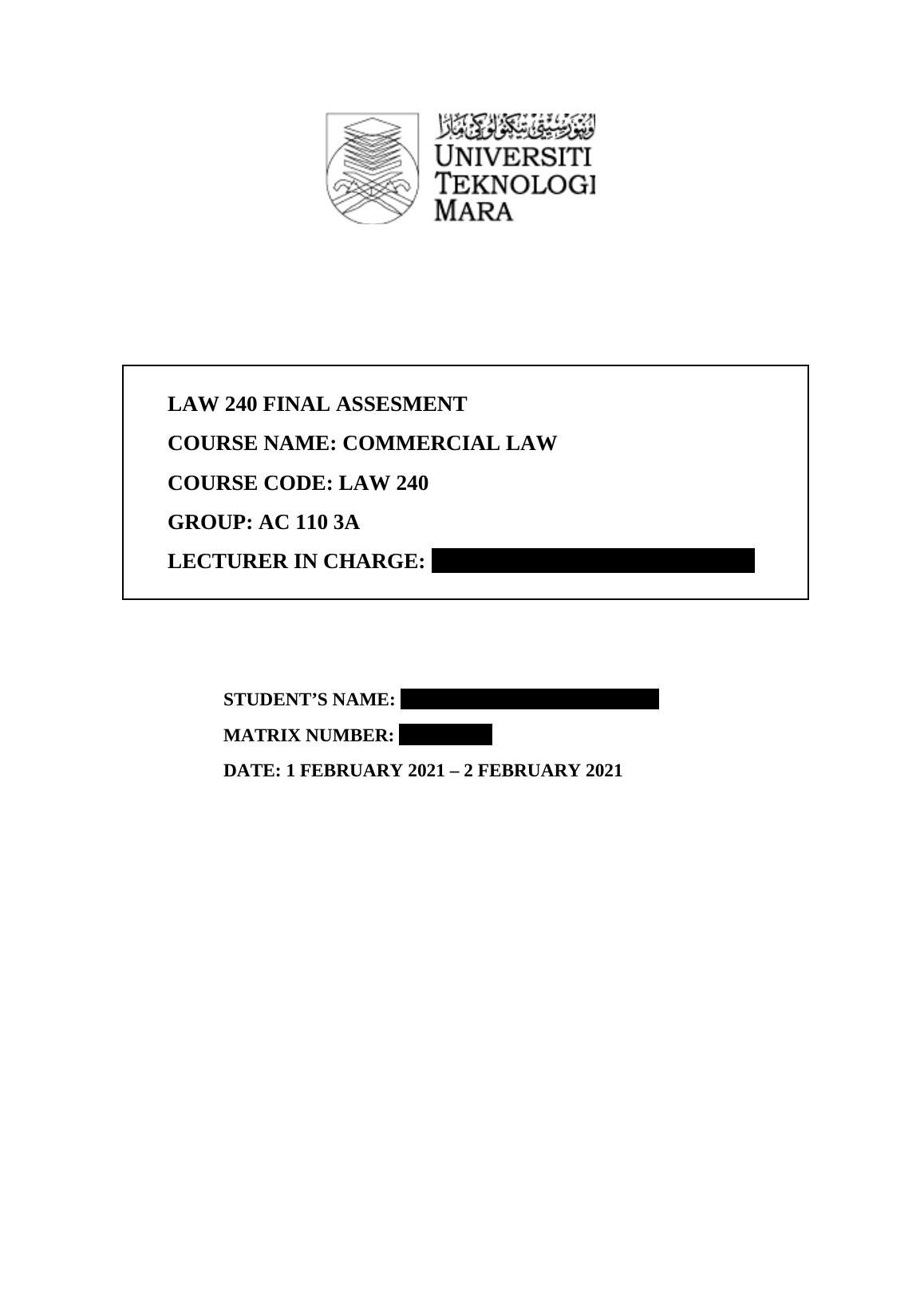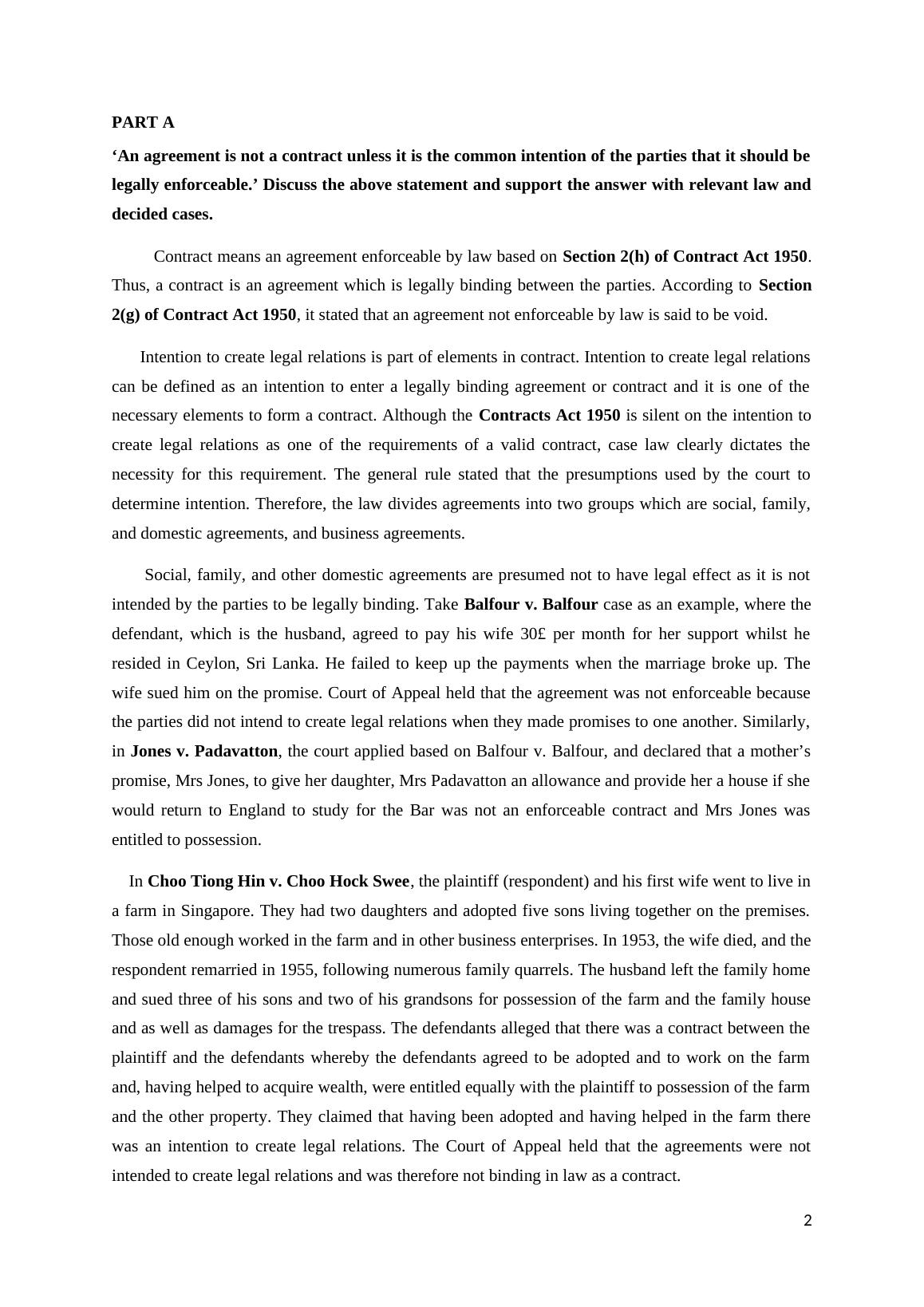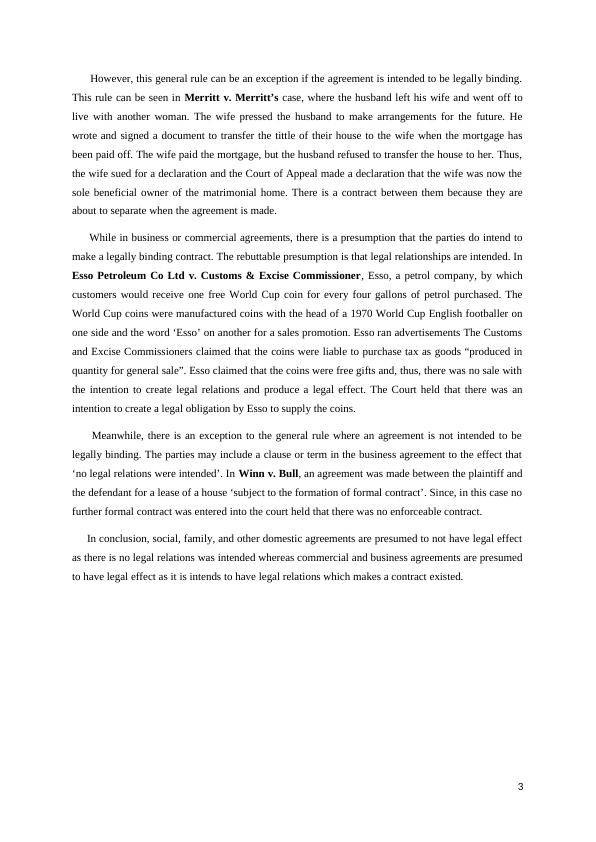LAW 240 Commercial Law Assignment
6 Pages2764 Words470 Views
Added on 2021-06-05
LAW 240 Commercial Law Assignment
Added on 2021-06-05
ShareRelated Documents
LAW 240 FINAL ASSESMENTCOURSE NAME: COMMERCIAL LAWCOURSE CODE: LAW 240GROUP: AC 110 3ALECTURER IN CHARGE: MADAM FADHILAH MD FAZILSTUDENT’S NAME: IZZAH YUSRA BINTI ISMAILMATRIX NUMBER: 2019224216DATE: 1 FEBRUARY 2021 – 2 FEBRUARY 2021

PART A ‘An agreement is not a contract unless it is the common intention of the parties that it should belegally enforceable.’ Discuss the above statement and support the answer with relevant law anddecided cases.Contract means an agreement enforceable by law based on Section 2(h) of Contract Act 1950.Thus, a contract is an agreement which is legally binding between the parties. According to Section2(g) of Contract Act 1950, it stated that an agreement not enforceable by law is said to be void. Intention to create legal relations is part of elements in contract. Intention to create legal relationscan be defined as an intention to enter a legally binding agreement or contract and it is one of thenecessary elements to form a contract. Although the Contracts Act 1950 is silent on the intention tocreate legal relations as one of the requirements of a valid contract, case law clearly dictates thenecessity for this requirement. The general rule stated that the presumptions used by the court todetermine intention. Therefore, the law divides agreements into two groups which are social, family,and domestic agreements, and business agreements. Social, family, and other domestic agreements are presumed not to have legal effect as it is notintended by the parties to be legally binding. Take Balfour v. Balfour case as an example, where thedefendant, which is the husband, agreed to pay his wife 30£ per month for her support whilst heresided in Ceylon, Sri Lanka. He failed to keep up the payments when the marriage broke up. Thewife sued him on the promise. Court of Appeal held that the agreement was not enforceable becausethe parties did not intend to create legal relations when they made promises to one another. Similarly,in Jones v. Padavatton, the court applied based on Balfour v. Balfour, and declared that a mother’spromise, Mrs Jones, to give her daughter, Mrs Padavatton an allowance and provide her a house if shewould return to England to study for the Bar was not an enforceable contract and Mrs Jones wasentitled to possession. In Choo Tiong Hin v. Choo Hock Swee, the plaintiff (respondent) and his first wife went to live ina farm in Singapore. They had two daughters and adopted five sons living together on the premises.Those old enough worked in the farm and in other business enterprises. In 1953, the wife died, and therespondent remarried in 1955, following numerous family quarrels. The husband left the family homeand sued three of his sons and two of his grandsons for possession of the farm and the family houseand as well as damages for the trespass. The defendants alleged that there was a contract between theplaintiff and the defendants whereby the defendants agreed to be adopted and to work on the farmand, having helped to acquire wealth, were entitled equally with the plaintiff to possession of the farmand the other property. They claimed that having been adopted and having helped in the farm therewas an intention to create legal relations. The Court of Appeal held that the agreements were notintended to create legal relations and was therefore not binding in law as a contract.2

However, this general rule can be an exception if the agreement is intended to be legally binding.This rule can be seen in Merritt v. Merritt’s case, where the husband left his wife and went off tolive with another woman. The wife pressed the husband to make arrangements for the future. Hewrote and signed a document to transfer the tittle of their house to the wife when the mortgage hasbeen paid off. The wife paid the mortgage, but the husband refused to transfer the house to her. Thus,the wife sued for a declaration and the Court of Appeal made a declaration that the wife was now thesole beneficial owner of the matrimonial home. There is a contract between them because they areabout to separate when the agreement is made. While in business or commercial agreements, there is a presumption that the parties do intend tomake a legally binding contract. The rebuttable presumption is that legal relationships are intended. InEsso Petroleum Co Ltd v. Customs & Excise Commissioner, Esso, a petrol company, by whichcustomers would receive one free World Cup coin for every four gallons of petrol purchased. TheWorld Cup coins were manufactured coins with the head of a 1970 World Cup English footballer onone side and the word ‘Esso’ on another for a sales promotion. Esso ran advertisements The Customsand Excise Commissioners claimed that the coins were liable to purchase tax as goods “produced inquantity for general sale”. Esso claimed that the coins were free gifts and, thus, there was no sale withthe intention to create legal relations and produce a legal effect. The Court held that there was anintention to create a legal obligation by Esso to supply the coins. Meanwhile, there is an exception to the general rule where an agreement is not intended to belegally binding. The parties may include a clause or term in the business agreement to the effect that‘no legal relations were intended’. In Winn v. Bull, an agreement was made between the plaintiff andthe defendant for a lease of a house ‘subject to the formation of formal contract’. Since, in this case nofurther formal contract was entered into the court held that there was no enforceable contract. In conclusion, social, family, and other domestic agreements are presumed to not have legal effectas there is no legal relations was intended whereas commercial and business agreements are presumedto have legal effect as it is intends to have legal relations which makes a contract existed. 3

End of preview
Want to access all the pages? Upload your documents or become a member.
Related Documents
LW120 Principles of Business Lawlg...
|6
|1851
|72
Law of Contract Issues 2022lg...
|4
|548
|31
Business Law Issue : Assignmentlg...
|11
|2557
|77
Contract Law: Comparison of Balfour v. Balfour and Merritt v. Merrittlg...
|7
|1774
|197
Business Law Assignmentlg...
|8
|1988
|208
The issue in consideration is that on one hand both Charlielg...
|5
|1537
|19
